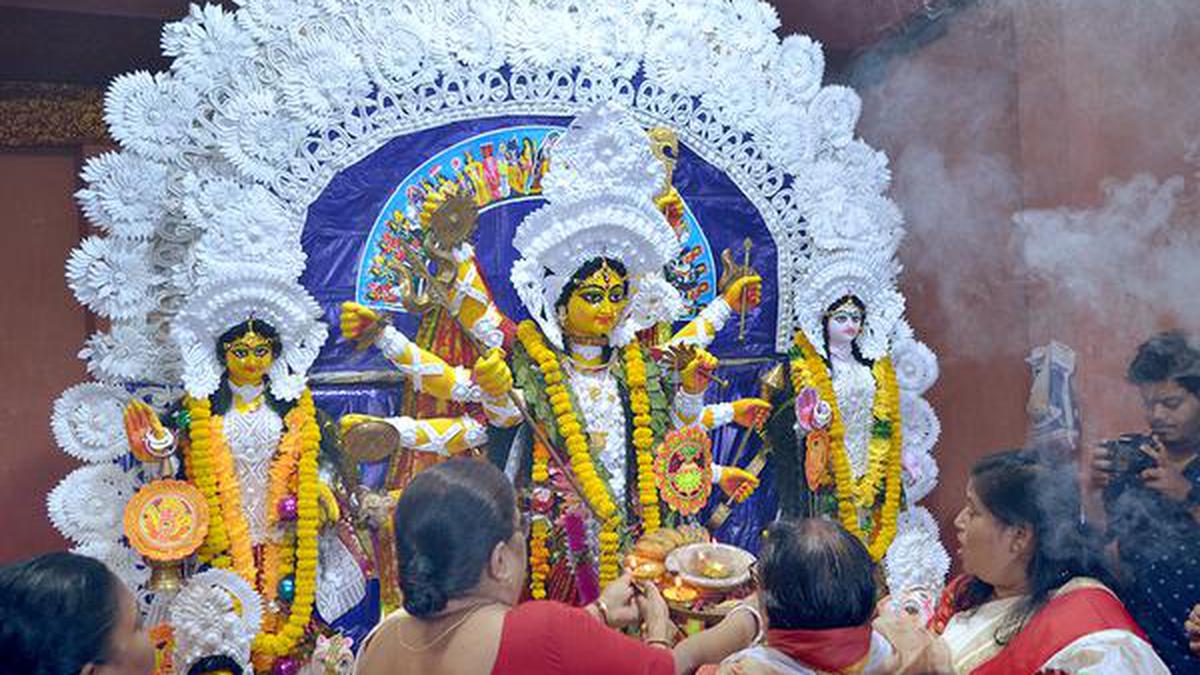
Gobardanga to Kolkata: how a family ferried its tradition across the border
The Hindu
Kundu family's Durga Puja tradition has been passed down for generations, even through Partition of India. Despite recent losses, the family continues to celebrate the autumn festival in Gobardanga, India, where they built their own house in 1965. The puja is a time for the 100 family members to come together, celebrating tradition and history.
Even deaths in the family have never stopped the Kundu family’s Durga Puja celebrations; this year they saw the deaths of their two seniormost members, and yet idols are being made for the autumn festival to be held at their home in the town of Gobardanga, just 30 km from the India-Bangladesh order.
“Two of my grandfather’s younger brothers died recently — one in February and another just last month. So, the 2022 puja turned out to be the last for one generation of the family and the first for another, because my daughter had just been born at the time. Such is life, you see, one ending is another beginning,” says Manas Kundu, 32, a trained physiotherapist who lives in Kolkata but visits Gobardanga, about 60 km from the city, every weekend.
Gobardanga is not where the family always lived. They originally belong to Batikamari village in Faridpur district in present-day Bangladesh, a place they didn’t leave even during Partition of India in 1947. They were a well-to-do family, which celebrated its own Durga Puja, a tradition handed down through generations. But soon after Partition, the atmosphere began to get hostile and the young men in the landowning family thought it might be safer to move to India.
And so, in 1956, Harendra Nath Kundu, along with his wife and son and a younger brother, set off for Calcutta. Their father, Upen Chandra, refused to move, saying he would not shift to India unless the family had its own house across the border — a house that must be complete with a cowshed, a puja mandap, and a courtyard.
The four who left Bangladesh — then East Bengal — arrived at Sealdah station, where they stayed in the refugee camps for several weeks as Harendra Nath looked for employment. One evening, all their belongings got stolen and the family became penniless. Destiny brought them face to face with an acquaintance from Faridpur, who now ran a grocery store in Gobardanga.
And thus began the Kundu family’s journey in India — a start from scratch. From working in the grocery shop, they started supplying rice to the market and eventually opened a rice shop in Gobardanga. In 1965, after living in various rented homes, they built their own house — complete with a cowshed, courtyard and a puja mandap. By then, several other family members had migrated and that year, Upen Chandra too relocated to Gobardanga — lock, stock and Durga Puja.
“No one in the family ever seemed to be sure how old our Durga Puja is. My great-grandfather saw the tradition being followed since his childhood, his father too saw it since his childhood, and so on. What is different about our puja is that you will find the positions of Kartik and Ganesh (the two children of Goddess Durga in the set of idols) interchanged as compared to the norm — Kartik is on Durga’s right and Ganesh on the left. Also, the asura is shown only as a human and not a buffalo,” says Manas, a grandson of Harendra Nath, who died in 2010.













